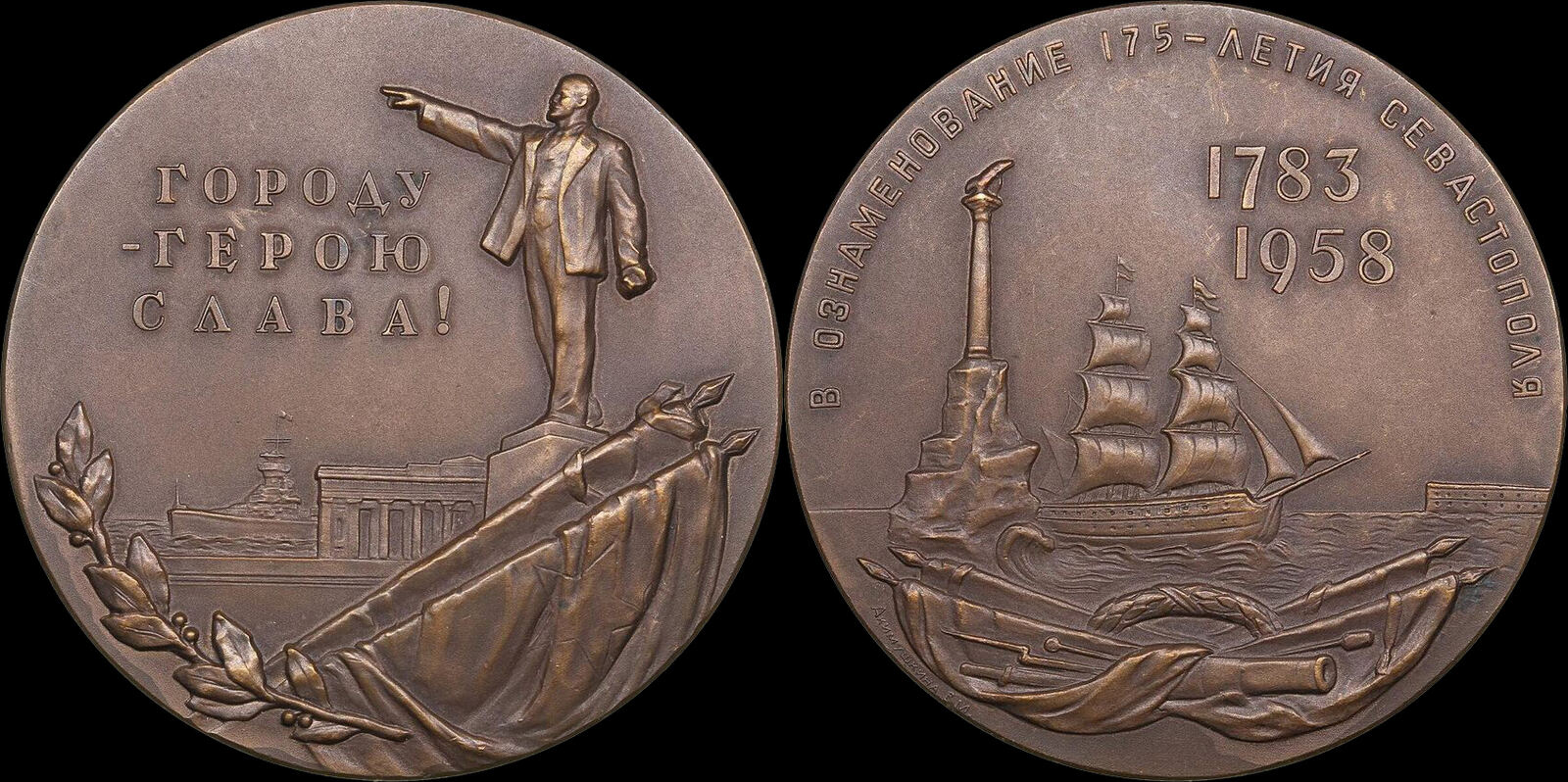MA-号码: 615402090
USSR / Russia 1958 medal - 175 years since the founding of Sevastopol UNC
Russia - USSR medal 175 years since the founding of Sevastopol, 1958
Shkurko, Salykov 140. Diameter 67mm. 139.31g. Tompac. Mintage 2998 pc. UNC. ЛМД. V.M. Akumuschkhina.
Sevastopol: A City of Strategic and Historical Significance
Sevastopol, located on the southwestern tip of the Crimean Peninsula, is a city steeped in history, military valor, and strategic importance due to its natural harbor on the Black Sea. Here's a brief overview:
Historical Foundations:
Sevastopol was founded in 1783 by Empress Catherine the Great of Russia, following the annexation of Crimea. Its name, derived from Greek and meaning "venerable city," reflects its ancient roots, though the modern city has no direct connection to the ancient Greek colony of Chersonesus, which lies nearby.
Military Legacy:
The Crimean War (1853-1856): Sevastopol became globally recognized during this war when it was besieged by British, French, and Ottoman forces for 349 days. The city's defenses, under the command of Prince Aleksandr Menshikov, held out until September 1855, marking one of the last classic sieges in history. This conflict also saw the city's naval base, home to the Russian Black Sea Fleet, become a focal point of military strategy.
World War II: Sevastopol faced another siege from 1941 to 1942 by Axis forces, enduring one of the most brutal engagements of the Eastern Front. The city's defense was heroic, with significant contributions from the Soviet Black Sea Fleet and the Separate Coastal Army. The siege ended with the city's fall on July 4, 1942, but it was liberated by Soviet forces in May 1944.
Post-Soviet Era:
After the dissolution of the Soviet Union, Sevastopol became the principal base for the Ukrainian Navy following Ukraine's independence in 1991. However, its status remained contentious, especially with the Russian Black Sea Fleet continuing to lease facilities in the city.
2014 Annexation: Following the 2014 Crimean crisis, Russia annexed Crimea, including Sevastopol, leading to international disputes over its sovereignty. Russia views Sevastopol as a city of military glory, integral to its naval operations in the Black Sea, while Ukraine and much of the international community consider it Ukrainian territory under occupation.
Cultural and Strategic Importance:
Sevastopol's strategic location has always made it a key naval base, influencing its development and the geopolitical dynamics of the region. Its harbor, one of the finest in the Black Sea, has been pivotal in both peace and war.
Culturally, Sevastopol is rich with monuments and memorials, reflecting its military history, including the famous Panorama of the Battle of Sevastopol, a vast painting depicting the 1854-1855 siege.
Recent posts on X (formerly Twitter) highlight ongoing discussions about Sevastopol's population growth, military activities, and its role in contemporary geopolitical tensions, underscoring its continued strategic importance.
Conclusion:
Sevastopol remains a city where history, military strategy, and geopolitical interests intersect. Its past sieges and its role in modern conflicts underline its significance not just as a naval base but as a symbol of resilience and strategic importance in the Black Sea region.
Shkurko, Salykov 140. Diameter 67mm. 139.31g. Tompac. Mintage 2998 pc. UNC. ЛМД. V.M. Akumuschkhina.
Sevastopol: A City of Strategic and Historical Significance
Sevastopol, located on the southwestern tip of the Crimean Peninsula, is a city steeped in history, military valor, and strategic importance due to its natural harbor on the Black Sea. Here's a brief overview:
Historical Foundations:
Sevastopol was founded in 1783 by Empress Catherine the Great of Russia, following the annexation of Crimea. Its name, derived from Greek and meaning "venerable city," reflects its ancient roots, though the modern city has no direct connection to the ancient Greek colony of Chersonesus, which lies nearby.
Military Legacy:
The Crimean War (1853-1856): Sevastopol became globally recognized during this war when it was besieged by British, French, and Ottoman forces for 349 days. The city's defenses, under the command of Prince Aleksandr Menshikov, held out until September 1855, marking one of the last classic sieges in history. This conflict also saw the city's naval base, home to the Russian Black Sea Fleet, become a focal point of military strategy.
World War II: Sevastopol faced another siege from 1941 to 1942 by Axis forces, enduring one of the most brutal engagements of the Eastern Front. The city's defense was heroic, with significant contributions from the Soviet Black Sea Fleet and the Separate Coastal Army. The siege ended with the city's fall on July 4, 1942, but it was liberated by Soviet forces in May 1944.
Post-Soviet Era:
After the dissolution of the Soviet Union, Sevastopol became the principal base for the Ukrainian Navy following Ukraine's independence in 1991. However, its status remained contentious, especially with the Russian Black Sea Fleet continuing to lease facilities in the city.
2014 Annexation: Following the 2014 Crimean crisis, Russia annexed Crimea, including Sevastopol, leading to international disputes over its sovereignty. Russia views Sevastopol as a city of military glory, integral to its naval operations in the Black Sea, while Ukraine and much of the international community consider it Ukrainian territory under occupation.
Cultural and Strategic Importance:
Sevastopol's strategic location has always made it a key naval base, influencing its development and the geopolitical dynamics of the region. Its harbor, one of the finest in the Black Sea, has been pivotal in both peace and war.
Culturally, Sevastopol is rich with monuments and memorials, reflecting its military history, including the famous Panorama of the Battle of Sevastopol, a vast painting depicting the 1854-1855 siege.
Recent posts on X (formerly Twitter) highlight ongoing discussions about Sevastopol's population growth, military activities, and its role in contemporary geopolitical tensions, underscoring its continued strategic importance.
Conclusion:
Sevastopol remains a city where history, military strategy, and geopolitical interests intersect. Its past sieges and its role in modern conflicts underline its significance not just as a naval base but as a symbol of resilience and strategic importance in the Black Sea region.
Info / FAQ
| Shipping fees | ||||
|---|---|---|---|---|
| 8.32 元 to 415.83 元 | 415.83 元 to 1,663.33 元 | 1,663.33 元 to 4,158.32 元 | over 4,158.32 元 | |
| China | 99.80 元 | n/a | n/a | n/a |
| Germany | 41.58 元 | 41.58 元 | 41.58 元 | 124.75 元 |
| Estonia | 41.58 元 | 41.58 元 | 41.58 元 | 99.80 元 |
| United Kingdom | 41.58 元 | 41.58 元 | 41.58 元 | 207.92 元 |
| United States | 41.58 元 | 41.58 元 | 41.58 元 | 332.67 元 |
| European Union | 41.58 元 | 41.58 元 | 41.58 元 | 207.92 元 |
| World | 99.80 元 | 124.75 元 | 831.66 元 | 831.66 元 |
Information
Online orders are welcome as always and will be shipped directly.
|
商店主页 | 0购物车 | 使用条件 | 联系 | MA 使用条件 | 隐私声明 | 保证期 | MA-Shops 新商品 Copyright ® 2001-2025, MA-SHOPS Coins All Rights Reserved. Designated trademarks and brands are the property of their respective owners. |
 Buy coins with warranty
Buy coins with warranty +49 (0)2871 2180 383
+49 (0)2871 2180 383 




















